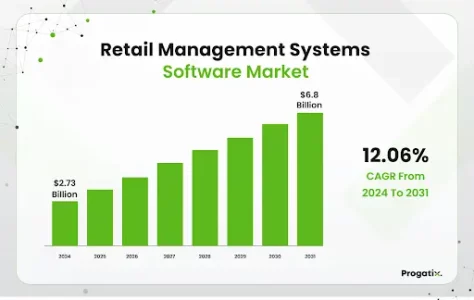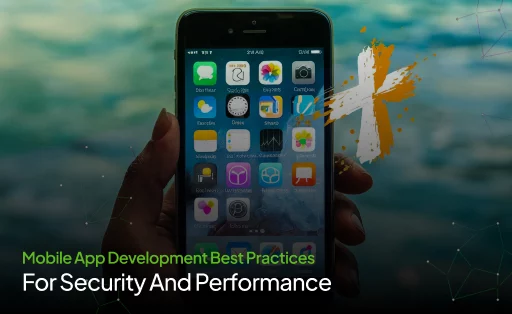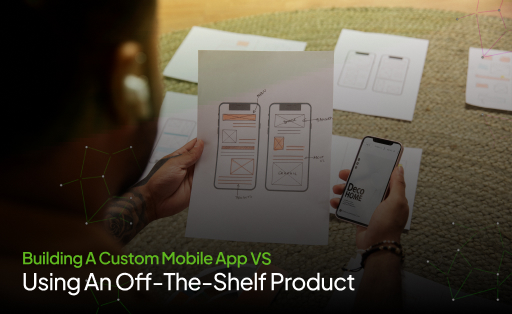Everything You Need To Know About Retail Software: Types, Benefits, And Features Software Development

To make an online store work, you need definite capabilities, usually attained through software applications. These proficiencies need to engage with each other. For example, a point-of-sale (POS) system not only accounts for purchases but also offers details about what was sold (to manage inventory) and to whom (to manage customer relationships).
Having a retail software can provide several benefits as it comes with multiple competences integrated into a single system, such as, improved efficiency, better decision-making, enhanced customer satisfaction, profitability, and productivity simply by automating and streamlining manual tasks.
As per VerifiedMarketResearch, Retail Management Systems Software Market size was estimated at USD 2.73 Billion in 2024 and is anticipated to reach USD 6.8 Billion by 2031, increasing at a CAGR of 12.06% from 2024 to 2031.
This blog explores some of the common types of retail software, their types, key features and benefits, and examples.
What is retail software?
Retail software, also known as retail management software, refers to digital systems utilized by retail organizations to handle numerous business activities, including stock control, payment processing, customer management, and bookkeeping.
In its broad and general sense, retail software refers to the programs and tools generated to support the processes that retail organizations perform, the goods they manage, the sectors they run in, and the areas they need to develop. From selling and purchasing activities to customer relations, stock management, and order fulfilment, these programs have become essential for retail business operations.
The retail software definition comes with wide-ranging functions that support diverse companies in their daily functioning and their ability to thrive in dynamic markets, with an aim to deliver consumer satisfaction. Retail software, due to the advanced uses of cloud, short for cloud computing, artificial intelligence, AI, and machine learning, can greatly impact the retail industry.
Types of Retail Software
Common types of retail software include:
-
Point of sale (POS) software
Point of sale (POS) systems manage all the processes included in approving in-person payments, working as the modern correspondent of a cash register. These systems cover the basics of calculating sales totals and generating receipts. However, more advanced systems such as Shopify POS can consist of features to handle inventory, track customer behaviour, and gather customer contact data (i.e., emails and phone numbers) for upcoming promotions and discounts.
-
Inventory management software
Inventory management software assists retail businesses in tracking what they’ve sold, what they have in stock, and what they want to order. Good inventory management software can automate processes, allowing you to automate ordering, set low-stock thresholds for reorders, and schedule alerts for stock-out or overstock settings. Inventory management software can also link up-to-date sourcing prices, which can help you save money during market variations.
-
eCommerce Software
eCommerce software is crucial for retailers seeking to expand their digital presence through an online store. It allows the creation and management of online platforms besides integrating with other retail systems and providing a smooth shopping experience, irrespective of the selective channel to shop from.
However, the retailers who have not employed eCommerce software yet are missing out on the wide online market restricting their reach and growth range. The manual management of online sales channels can end up in unreliable customer experiences, inventory mismatches and maximized operational loads, obstructing the overall business performance.
-
Marketing Software
Marketing software is one of the biggest software development outsourcing trends, as it strengthens retailers to create, handle and analyze marketing campaigns throughout multiple channels besides allowing targeted communication, automates tedious tasks, offers insights into campaign performance and helping retailers catch new customers and keep the existing ones.
Without marketing software retailers would have to go back to the time-consuming manual marketing processes making it difficult to scale campaigns or analyze their productivity. This would possibly end in generic and less effective marketing efforts that fail to connect with customers or highlight in the crowded marketplace.
-
Accounting Software
It streamlines the financial management for retailers, automating tasks such as tracking sales, profitability and overheads. It offers valuable financial insights, assisting retailers to make informed decisions while ensuring compliance with financial regulations.
Without these systems, retailers would have to execute the tasks manually, such as bookkeeping, which is inclined to errors and inadequacies. Also, it further leads to inaccurate financial reporting, cash flow concerns and possible legal issues, jeopardizing the economic health and stability of the business.
-
Customer relationship management (CRM) software
Retail software is employed by businesses to handle diverse features of their retail supply chain as it has competencies of improving accounting and inventory accuracy, witnessing business performance, or keeping track of crucial customer information. CRM software acts as a backbone for developing and maintaining strong and reliable relationships with customers by following the targeted approach and focusing on providing personalized solutions that accurately understand and anticipate customer demands.
Discover top retail software features today!
Let's ConnectHow does retail software work?
Retail software runs by automating and digitizing key retail management processes to streamline operations, improve efficiency throughout the business, and reduce costs. It combines sales processing functions with features including vendor management, inventory, sales, customer service, marketing, and accounting.
Retail management software is used for a number of applications, including warehouse management, transport management, and merchandising activities. You can install retail software on-site or access it through cloud-based subscriptions, relying on the requirements and preferences of the business.
There are several types of retail software, with each serving to optimize a diverse aspect of a company’s operations.
Retail warehouse management systems, for example, are used to manage the movement and storage of materials, products, and finished goods in a retail warehouse, brick-and-mortar store, or other storage facility.
Benefits of Retail Software
-
Accurate records/ improved accuracy
Accuracy is vital in retail, where even the smallest discrepancies can have substantial impacts. Therefore, digital systems can be the only source of providing reliability and accuracy for managing company data, as they are less prone to errors than manual systems. Retail software automates critical processes and enforces standardized protocols to ensure reliability against errors and variations. Whether it’s inventory tracking, pricing calculations, or financial reporting, retail software safeguards pinpoint accuracy and data integrity, thereby reducing the risk of costly mistakes and regulatory compliance concerns. With better accuracy comes improved trustworthiness, strengthening retailers to instil confidence in their stakeholders and support their reputation for reliability and professionalism.
-
Improved Customer Experience
In the era of practical retail, customer satisfaction reigns the highest. Retail software plays a fundamental role in organizing seamless and personalized shopping experiences that echo with today’s perceptive consumers. By leveraging the potential of data analytics and customer insights, retailers can expect individual preferences, customize product recommendations, and deliver direct promotions, encouraging deeper networks and reliability. Moreover, retail software allows Omni channel integration, enabling customers to occupy brands smoothly across several touchpoints, whether online, in-store, or through mobile devices. This holistic approach not only improves ease and accessibility but also promotes lasting relationships that exceed transaction limitations.
-
Improved Productivity/Improved Efficiency
In the competitive era of retail, time is money. Retail software acts as a force multiplier, automating routine tasks such as inventory management, order processing, and reporting. By excluding manual intervention and simplifying workflows, retail software frees up valuable time and resources, enabling employees to emphasize high-value activities like customer service and strategic planning. This intensified efficiency not only hastens working processes but also enhances overall productivity and agility, allowing retailers to stay ahead of the curve in today’s fast-driven market.
-
Better Decision-Making
In the current dynamic era of retail, informed decisions are the key difference between success and unproductivity. Retail software serves as a strategic scope, offering retailers actionable insights and real-time analytics to lead their decision-making processes. By collecting and analyzing huge amounts of data spanning sales trends, customer behaviour, and market dynamics, retail software exposes hidden patterns, identifies evolving opportunities, and moderates potential risks. Equipped with this invaluable intelligence, retailers can make data-driven decisions that optimize resource allocation, improve marketing strategies, and benefit from market trends, thus placing themselves for continuous growth and competitive advantage in an ever-developing marketplace.
-
Real-Time Transparency
The retail software solution offers complete control of warehouse and shop floors online, besides helping you understand your demands. Retail software helps by calculating up-to-the-minute sales, tracking inventory, and recording order data. It enhances inventory management by inevitably tracking stock, generating purchase orders, and identifying slow-moving items. Real-time data can help in reducing overstocking and the possibility of stockouts.
-
Automation
Automation is the exceptional benefit of employing retail software for business management. Retail software automates every aspect of business management and makes it easy for retailers to manage business efficiently. It helps in generating accurate sales reports with no human error. Additionally, a retail outlet automation system, specifically, helps by automating in-store tedious tasks such as reporting, auditing, billing, return processing, payroll records, pricing regulations, etc.
-
Cost and Time Saving
Time is at the core when it comes to any business, and so are the costs for both purchase-returns and preparing new employees. Retail software lessens these costs radically. With retail software, you can train users on the systems and processes within a few days. Furthermore, they begin comprehending the purchase and sales cycles by viewing trends and sales reports from the central dashboard.
For the management, making big decisions becomes smooth with custom-gathered reports from different stores and items that give them a bird’s eye view of the business and on-call goods, allowing them to acquire more and get more advantages.
Unlock the potential of retail software solutions!
Let's ConnectKey Features of Retail Software
When analyzing retail software solutions for your business, it’s important to consider key features that can make a major impact on your operations. Here are some vital features to look for:
-
Scalability
Your retail software should be able to grow and adapt alongside your business. Look for solutions that offer scalability features, allowing you to seamlessly expand your operations, add new users, and integrate additional functionalities as your business expands. Scalability ensures that your software investment remains relevant and effective in the long run, accommodating increasing demands and complexities without disruption.
-
Cloud Solution
Data is sovereign when it comes to challenging the existing retail setting. So, if you are not already on it, it’s time to shift your business to the cloud. Retail software must have cloud abilities that enable you to view your reports, stock availability, and customer details in real-time. The sort of reports accessible at the store level must comprise complete sales, daily budgets, and backfill reports to enable timely and informed decisions.
-
Integration Capabilities
Effective retail operations rely on the smooth data transfer between different systems and tools. When selecting retail software, arrange solutions that provide robust integration capabilities. Look for software that can smoothly integrate with other essential tools and systems utilized in your business, such as accounting software, e-commerce platforms, and customer relationship management (CRM) solutions. Integration assures smooth and cohesive operations, removing data silos and reducing manual data entry, eventually improving efficiency and productivity.
-
Customization Options
Every retail business is distinctive, with its own set of needs, workflows, and preferences. To take full advantage of the value of your retail software investment, look for solutions that provide extensive customization options. Besides, it allows you to tailor features, workflows, and user interfaces that align with your specific requirements and processes. Customization strengthens you to constitute the software as per your business requirements, ensuring a custom solution that optimally supports your operations and workflows.
-
Mobile Accessibility
In today’s fast-paced retail environment, mobility is key to staying associated and productive. Go for retail software that provides robust mobile accessibility features, enabling you to access crucial business information and perform important tasks anytime, anywhere. Look for solutions that propose mobile-friendly interfaces and applications optimized for numerous devices and operating systems. Mobile accessibility allows you and your team to stay productive actively, whether you’re on the sales floor, appearing at trade shows, or meeting with clients. With mobile-supported retail software, you can stay up-to-date, receptive, and agile, improving your overall efficiency and effectiveness in the market.
-
Reporting and Analytics
Data-driven insights are crucial for making informed decisions and driving strategic success in retail. When assessing retail software, focus on the solutions that offer strong reporting and analytics capabilities. Look for software that offers comprehensive dashboards, customizable reports, and advanced analytics tools allowing you to obtain profound insights into your business performance, customer behavior, and market trends. Reporting and analytics strengthen you to recognize opportunities, optimize processes, and lessen risks, ultimately improving your competitiveness and profitability in the retail setting. With access to actionable insights, you can make data-driven decisions that drive your business onward and drive viable growth.
-
Employee and Vendor Management
A robust store management system helps manage your employees and vendors in a better way. Your employees, for instance, can track their job duties and schedules on the system after logging in. At the same time, vendors can look over the inventory and place an order for more products if required, making your workforce more effective and liable.
-
Financial Management
Running a retail business involves managing a number of records and keeping track of money. You are required to manage your stocks, keep track of your employees, record sales, monitor revenues and overheads, deal with annual reports, and the list goes on.
A retail management app that integrates with financial reporting is a better way to manage store sales. It saves you a huge amount of time and helps you effectively and precisely handle all the aspects of your retail business.
Conclusion
Retailers facing struggles in managing different systems, keeping track of sales and inventory, and manually entering orders is a waste of valuable time while leading to inefficiency and disorganization, holding you back from success. Instead, retailers can utilize this time for more key tasks.
To compete with other retailers and stay competitive in the market, businesses are required to streamline their operations. And it can be possible through investing in an ERP system leveraging advanced and up-to-date technologies.
Retail software is a game-changer for modern retailers, offering a number of benefits. By employing the right fit of retail software solutions customized to their business’s particular needs, retailers can stay ahead of the competition, satisfy customers, and drive sustainable growth in today’s dynamic market.
So, if you’re ready to streamline and escalate your business with retail software, connect with Progatix, a reliable software development provider that boosts your retail operations with innovative software solutions, including ERP and POS functionalities. Learn how our tailored software solutions can transform your business. Contact us now and start your journey towards retail success!



 Let's Discuss Your Tech Solutions
Let's Discuss Your Tech Solutions 






